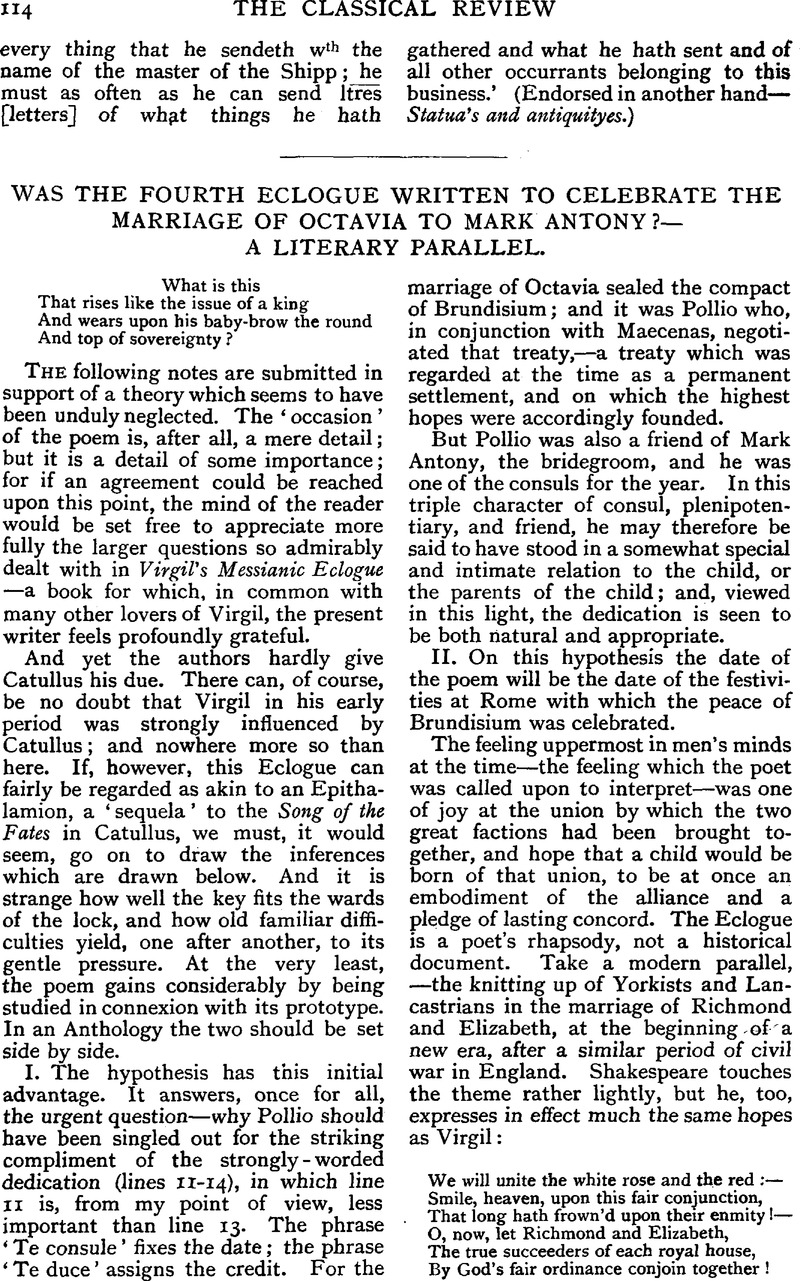Published online by Cambridge University Press: 27 October 2009

page 115 note 1 See Munro, , Lucretius, iii. 57.Google Scholar
page 115 note 2 Virgil, I take it, wishes the reader to picture to himselfat least the Epilogue of Catullus LXIV. as the background of his song. Thuswe have a suggestion that the worst has been reached—and passed: ‘The night is darkest before the morn; When the pain is fiercest thechild is born; And the day of the Lord is at hand.’
page 116 note 1 There is a temptation to see in the words a reference to the tradition referred to by Ellis in his commentary (LXIV. 27). An Alexandrian might well have played with this idea. But the style of the Eclogue is altogether too simple. See rather the Messianic Eclogue, p. 140.
page 116 note 2 Eclogue IV. 34 sqq.
page 116 note 3 Patriis might conceivably mean simply i.q. Romanis; Horace, Carm. ii. 7. 4, ‘Dis patriis Italoque caelo.’ In Virgil, Aen. iii. 332 (q.v.), the critics disagree — e.g., Mackail renders ‘ancestral,’ Conington‘his father's altars.’ Possibly Virgil intentionally chose an amvirtutibus' biguous word. Anyone who has ever drafted a document in which the views of two opposing parties had to be embodied will know how strong is the temptation to clutch at a word or phrase of more than single meaning on which each faction can put its own (quite distinct and different) interpretation.
page 116 note 4 It is important for my argument to note that the only ‘capital’ MS. which contains this section of the Eclogue, the Codex Romanus (assigned tentatively by Nettleship, C.P.L., Praefatio, to the fourth century A.D.), reads parentum (not parent's) at line 26.
page 117 note 1 Similarly Cassandra in the Agamemnon, and similarlythe witches in Macbeth (IV. 1 init.), express the future in terms ofthe present: Macbeth sees the children who are to be born hereafter pass before him. Virgil elaborated this device more fully in the vision of Aeneas in Elysium (Aeneid, VI.) Gray employs it in The Bard. N.B.—In ‘nascenti puero’ the participle is a Praesens Futurascens. The phrase = ‘to the child who is to be born.’ Cf. Aen. x. 27 (and 74), Muris iterum imminet hostis (Nascentis Troiae=this embryo Troy). The perfect ‘tulerunt’ in line 61 is, it must be admitted, extremely bold, but scarcely bolder than the reliquit of G.i. 35, and assuredly not bolder than the metrical license, which can only be justified as a homely touch meant to be in keeping with the homely scene described. The material for a generalisation on this latterpoint is collected and reviewed by Munro on Lucretius (i.406). ‘It mus't always’ (he says) ‘have been a familiar pronunciation.’ To his list of instances add Horace's ‘deděrunt’ (Epistles, I.iv. 7) and ‘vertgrunt’ (Epode IX.17). ‘Fuerunt’ in Lucretius (e.g. v. 474 and 667) may fairly be regarded as a disyllabic All the other examples belong apparently to the sermo cottidianus.
page 117 note 2 See Ellis, ad loc.
page 118 note 1 As often in Greek and Latin poetry, cf., e.g., the close of the Antigone, and of Horace, Carm. III. 5. See Virgil's Messianic Eclogue, p. 69.
page 118 note 2 ‘Les arts sont fibres.’ The Sherborne Pageantended on this note. And no one who was there or who has heard the scene described will ever forget the effect with which the little child was introduced as a finale.
page 118 note 3 The above is only an outline. The correspondences might easily be worked out further. Thus C1 and C2 fall also into four stanzas each, but not, apparently, into stanzas of an equal length: C1=3.2.3. 5., C2 = 3. 2.4. 4., e. 3.2. 8. and 3. 2. 8. The transposition of (e.g.) line 30 to follow line25 would give us 2. 4. 4. in each. But such absolute precision by no means essential. See Ellis, loc. cit.Most of the Eclogues are built up about similar though simpler schemes. Cf. especially numbers VI I.-X.The Second would gain appreciably if the first five lines and the last wereregarded as Prologue and Epilogue respectively. The ‘song’ proper stops at line 68, ‘Quisenim modus adsit amori ?’ In 69–73 Virgil points the moral. Cf. Theocritus X. 56–58 rather than XI. 72 sqq.
page 119 note 1 In the Sixth Aeneid Augustus is hailed in so many wordsas ‘the promised deliverer of Rome’: ‘Hic vir hic est, tibi quern promitti saepius audis,’ etc. Perhaps some suchtitle as ‘⋯ ⋯ρχ⋯μενος’ occurred in the Sibylline Books.
page 119 note 2 See Virgil's Messianic Eclogue, p. 48 note.
page 119 note 3 In an address to the Classical Society of the University College, Cardiff, published in his Lectures on Poetry.